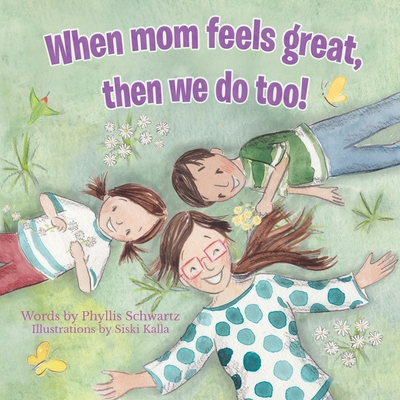 When Mom Feels Great, Then We Do Too!
When Mom Feels Great, Then We Do Too!
I have to admit, I was already won over by the title of Phyllis Schwartz's picture book, When Mom Feels Great, Then We Do Too! Or, as I like to say to my son, "If Mommy-Man ain't happy, ain't nobody happy." This gentle story, illustrated with colorful, soft-edged drawings by Siski Kalla, teaches empathy to young children while managing their anxieties about a parent's illness.
Inspired by her own cancer recovery journey, Schwartz's book suggests practical ways for kids to share in household responsibilities during a difficult time. As the title says, this is good for the whole family. Children won't feel so helpless, and adults won't be as overwhelmed.
The fictional mother's illness is described in very general and non-threatening terms: she feels tired, has to spend a lot of time in bed, goes to the doctor who "took out some bumps" (tumors), and quickly returns home to recuperate. This makes the book useful for many types of chronic illness and disability that could happen to readers' parents.
While we know that cancer isn't fixed that easily in real life, sometimes young children need reassurance most of all. Schwartz is telling an upbeat story whose goal is to empower kids when they're afraid. The book offers age-appropriate ways for children to help, without putting too much of a burden on them. They don't have to come up with the answers because the father in this story is still a source of security. He guides them to make their mother's favorite foods, play more quietly, not get into sibling fights, and find low-key activities to entertain her while she's housebound. The family is also shown as part of an extended caring community that includes adult friends and their grandmother.
This ideal scenario may not be achievable for some readers with sick parents, which could make them feel sad. My co-judge Ellen LaFleche said, "I love the creative things the kids did, but I'm not sure if that would happen without cajoling in real life!" On the other hand, children's literature has always had an aspirational or didactic component. Maybe this fictional domestic utopia will help other readers realize that they could be sharing the caregiving load in a better way.
Ellen and I both felt the writing would have been better if the author stuck to prose narration. The attempted rhymes often didn't come off, and the meter was inconsistent. Children's book authors should think more carefully about whether poetry is in their skill set and why a verse style would enhance the story (or not). For example, a humorous or fantasy story gains playfulness from a well-executed poetic form, whereas a serious or realistic one may not need that.
The book design was pleasant, with a sturdy hardcover binding and large readable type well-integrated with the lovely illustrations. The characters' faces and poses were expressive with just a few simple lines. Ellen observed that the book had some chemical odor, which is a problem we encounter with a lot of self-published illustrated entries.
I would have put the title in title case (When Mom Feels Great, Then We Do Too!) rather than sentence case (When mom feels great, then we do too!) on the front cover. It would look more professional that way. The title typeface didn't harmonize well with the author/illustrator one. On the book spine, they're both in the author/illustrator typeface, which is more elegant and fits the old-fashioned cozy vibe of the cover illustration.
When Mom Feels Great, Then We Do Too! would be a good book for doctors and school counselors to keep in their offices. It sends a positive message about families overcoming adversity by being kind to one another.
Read an excerpt from When Mom Feels Great, Then We Do Too! (PDF)









